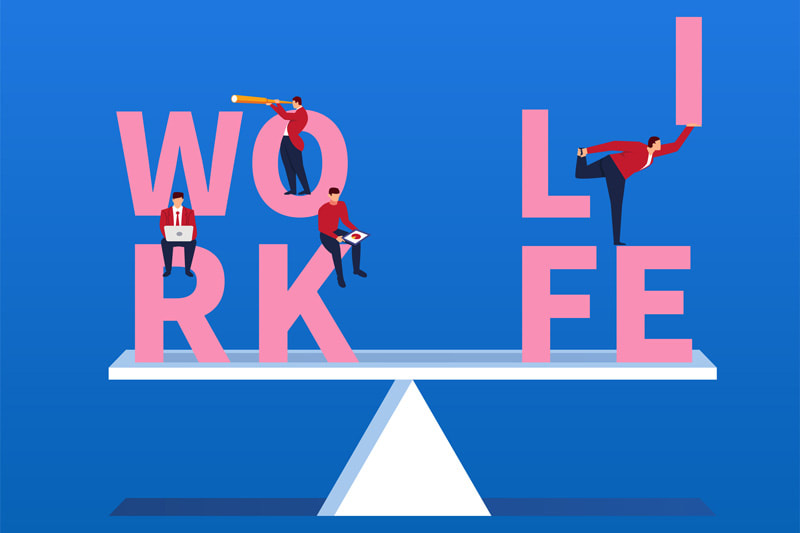|
Our managing director Travis Smith covers five (5) key questions anyone in a buying position should be asking a consulting firm or individual consultant to better qualify them prior to making the buying decision.
Read the full article at www.sqr1services.com/white-papers/how-to-solve-your-1-business-challenge
0 Comments
Monday Quickie - Your Desire for 'Work life Balance' is Hurting Both Your Career & Personal Life10/14/2019 Article was written by guest writer Trisha Aure
Many of us live two lives. These two lives run on parallel tracks to one another yet few of us understand the dichotomy which exists by having a work life and a home life which operate separate from one another. We’ve been told growing up these lives need to be mutual exclusive of one another where we don’t bring our personal life and issues to work and vice versa. This inevitably creates a variety of issues for us at both the home and office. The biggest issue it creates is our ability to grow as people which leads to our ability to grow as professionals. Have you ever heard that personal growth is necessary for professional growth? It is, I just didn’t realize how critical this was till about 6 years ago. Some people believe separation needs to exist between work and home, or ‘work life balance’ as we commonly like to phrase it. I’m not convinced ‘work life balance’ is possible, especially not if you are looking to create a long term successful career which your personal life benefits from. This ladies and gentlemen is where my career ah-ha moment began – the idea of a ‘work life balance’ is garbage. We look at this phrase typically from the work side of things meaning we should work less in order to enjoy our personal lives more. Yet how often are we looking at this phrase from the personal side to understand how we impact our professional experience based on who we are outside of work. It goes both ways and to think a steady ‘balance’ between the two is possible is a dream in fantasy land. I was in a new company and aggressively working on advancing my career. I had a lot of personal baggage I thought I was leaving at the door before I walked into the office. I had some deep heartache within my family dynamic that I never figured out how to live with, so I decided to act as though my life was perfect and I ignored my past. This act forced me to live two different lives and I will tell you, this was not only one of the hardest parts of my life but it was definitely the loneliest. This is where I learned I wear my heart, and therefore emotions, on my sleeve. This isn’t necessarily a bad thing, because that is where my passion comes from, the heart. What I learned is when you are essentially living two different lives, it starts to take a toll on both your career and personal life. I had received some hard feedback and it was based on my attitude because I was aggressively trying to hold my personal struggles back. If anyone has ever been here before you know that holding feelings back only creates a blow up later down the road and mine happened at work. Luckily, I had great people around me that cared about me professionally AND personally. I obtained a mentor and started receiving coaching on how to deal with my struggles that I quite frankly kept pushing down for over a decade. It was not an easy nor short process. Then again, anything worth having or doing right isn’t easy in the first place. I started working on building a healthy mind, body and soul, and 6 years later I’ve continued this quest not stopping once. Growth is an everyday event and I have built some great routines that have helped me merge my two lives between home and work. After 6 years of focus, dedication and some really hard work to improve myself I have lost 40 pounds (and kept it off), I’m in a leadership role with a company I’m part-owner in, I’m actively involved in the community and constantly improving my life on both sides. I honestly do not believe I would be where I’m at today if I continued to try and live two different lives. To tie this all together, I believe that growth within your career begins at home. Have you ever heard, you can’t love someone until you love yourself? I believe that this internal love for yourself will only push you to cross any and all boundaries that you put up yourself. Stop putting up boundaries, and add some goals to your life. Once you start pushing forward, it’s crazy how that turns into unstoppable. Key Take Away You must take care of yourself in order for you to strive in other parts of your life. In regards to work and life, this is an AND, not an OR. We need to be confident in both in order to grow in both. I’m continuously reading leadership books and I can relate what I read in both my professional and personal life. We need to do away with catchy slogans like ‘work life balance’ because all they do is drive us to live a lifestyle which isn’t attainable. Action Item If you are stagnant in your career, or struggling with something personally and you see it hindering other aspects in your life, find someone to talk to, find a mentor, find a coach to help you figure out how to get over that hump. I currently have a mentor which I found on micromentor.org. This is a free site and it matches you with people that are looking to grow their career in various areas. Growth is definitely uncomfortable and no one likes change, but building a strong support system will help guide us in achieving our goals and creating a well balanced successful life. Leadership is one of the hardest things a person can do professionally. There’s no manual, no playbook, no cliff notes that give leaders the ‘secret sauce’ to successfully lead the charge. Sure there are thousands of avenues one could go to learn more about leadership however at the end of the day it’s still a job that mainly rests on intangible actions like care, empathy, intuition and respect for the very people leaders serve. Leading is often described as a lonely experience. Elisabeth Elliott, a famous author, speaker and missionary once said “Loneliness is a required course for leadership.” The feeling of loneliness at the top is much more common than most of us realize as more than 50% of leaders indicate they have experienced loneliness at one point or another in their career. The stats are even higher for first time leaders at a whopping 70%. When leaders experience solitary the impacts can be devastating. Isolation and loneliness have a direct negative affect on a leaders’ performance which then directly impacts their employees, departments, business units and companies. How is it then leaders find themselves down in the dumps on lonely island? Some of the most common causes are: 1. Forced Isolation- Leaders seclude themselves from the rest of the group by working in an office which can create imaginary barriers between them and their staff. Closing the door actually creates a real barrier that communicates “I’m not available and don’t have time for you”. Regardless if this isolation was intentional or unintentional it produces the same results where the leaders’ staff hesitate to communicate with their boss, or not at all. 2. Decision Making- In most businesses decision making is typically left to the people carrying the torch. When decisions go well all is good in the world yet when decisions produce less then spectacular results the leader is left out in the cold to take the brunt of the responsibility. It’s part of the job but it can also produce isolation at a whole new level which isn’t typically understood or felt by the company’s employees. 3. Don’t Ask For Help- Many times isolation is self-inflicted as leaders don’t ask for help from their teams or peers. There’s an unspoken feeling for many leaders which goes something like, “they expect me to know everything because that’s what I get paid for and why I’m in the job”. Thoughts like this can be incredibly damaging and certainly have no justifiable basis for being correct or healthy. 4. Lack Humility- When leaders act in a way which broadcasts ‘I’m more important than you because I’m in a leadership role’ employees quickly disengage, refraining from putting effort in to build relationships with their leaders or working hard on their behalf. When leaders act this way many times it can be attributed to ego or overcompensating for a lack of confidence. 5. Poor Treatment of Others- One of the quickest ways a leader can find themselves on lonely island is by treating their employees or staff in a poor manner. They lack emotional intelligence. (EQ) When employees feel like they aren’t valued or respected they withdraw which commonly leads to limited interaction and feedback with leadership. The result is a drift occurs in the organization between what leadership wants and what employees are doing. Let’s be clear here, we aren’t about to throw a pity party for our leaders. They’re grown ups right, big boys and big girls who have made the choice to enter leadership on their own accord. So if they’re feeling isolated or lonely than it’s by their own doing, right? Not necessarily. While we’d all love to think the statement above is accurate the reality is that employees do in fact have some ownership in the leadership isolation situation. Employees have a unique ability to see things their leaders don’t, hear things their leaders don’t and help in situations where their leaders would otherwise be clueless about. These five options when implemented help to foster an environment of support and mutual respect, one in which both leader and employee benefits from:
When leaders and employees work together and support one another it significantly reduces the likelihood people of any kind will experience isolation. “There is no respect for others without humility in one's self.” - Henri Frederic Amiel Key Take Away: If you’re feeling lonely as a leader chances are it’s a result of your own doing. Sorry to hit you with the brutal honesty. Loneliness in leadership impacts more people than just yourself. One of the best ways to overcome it is to join a peer group or get a leadership mentor/ coach. Action Item: Feeling like you’re on lonely island right about now? Select two people from your company, one of which needs to be a direct report, and ask them for their candid feedback. Start by telling them how you’re feeling and your desire to do something about it. Get vulnerable and ask for their help while creating an environment where people feel comfortable telling you how they perceive you and your presence as a leader. After you receive the feedback – SHUT UP! Don’t argue about it, don’t disagree. Just listen, observe and take it all in. Thank the person for their feedback and take the rest of the day to smolder on it. With time and patience, you will begin to open yourself up to hearing other people’s perspectives while learning how to take their words and incorporate it into a new you. Now, go get em, champ! Twice in my career I've been in a slump.
Statistically I'm not sure where that puts me in comparison to others having to do with 'career slumps' however I can openly and honestly admit those two experiences were incredibly challenging and equally as eye opening in my personal and professional development. What is a career slump? It can be a lot of things. A career slump can be a period marked with stagnation, little to no growth, periods of failure, challenges with our mindset and passion to succeed. Career slumps are all of these things and perhaps none of them at the same time, it just depends on your situation. A career slump could include mediocrity, boredom for extended periods. Lack luster attitudes and or a general malaise where we 'mail it in' on the daily. These are characteristics of a career slump. What I've learned from my two career slump experiences was it was near impossible to get out of it until I understood what got me there in the first place. I'm nervous talking about this. Being vulnerable on a stage like social media isn't necessarily an enjoyable walk in the park yet I've learned that many others share my same struggles so I choose to offer my experiences in the hope that it helps others. Sharing also helps me understand myself better and become more confident with who I am, what I'm capable of and what my 'why' is for doing what I do. There, right there. That's the answer! Getting out of a career slump isn't some magical experience or event that gets you back on track, its sharing and talking about what you're experiencing, how you're feeling emotionally and being aware of how that's impacting you and your career. Whether we want to admit it or not all of us at one point or another will experience a career slump. No one is perfect and times of strife in this life, more accurately our careers, are inevitable. The key is to dealing with a career slump is acknowledging it, accepting that it’s real then acting to change it. Similar to the psychiatric process called the ‘five stages of grief’ how we handle dealing with a career slump is a process of admittance, understanding and then action. It's a lot of soul seeking and working through your feelings to try and understand your mindset and what brought you to your present place. Here's what has worked for me: 1. ADMIT: Recognize and admit things aren't great. Say it out loud. 2. PRESENT STATE: Ask yourself how you feel in this moment. Write it down. 3. EVENTS: Trace back the last 6 months to a year and unwind your experiences, successes, struggles to understand the chain of events which brought you to your career slump 4. DIGEST: Sit on this information for a couple days. How does it make you feel? Do you now know why you're in a slump? 5. SHARE: Go find two people to talk with. Share with them your situation and present feelings on the matter. (I know...this is a lot of talk about feelings and emotions. Sounds awful, right. The quicker you can get beyond that the quicker you'll find yourself on the road to confident successful empowered you) 6. KEEP GOING: Keep sharing your experience with people. The more the better. You'll begin to notice the more you talk about it the better you feel and more accepting you are of the situation. 7. TRANSITION: Now that you know what's going on start out every day with 20 minutes of mindset activities to get you on the road to a positive you (workout, yoga, meditate, do your favorite activity, listen to music, sit in silence, etc.) It’s all about cultivating a positive mindset which drives who you are and your actions for the day in front of you. 8. ACT: commit to yourself that the experiences you had leading up to your career slump don’t define who you are. In fact, they make you better! Now is when we need to make some changes to our career. Implement a new office schedule, get rid of work if you’re overloaded, take on a new project to get yourself out of your comfort zone. Maybe you need to find a new job! Whatever it is, the new you, the new focus must be different than what you were doing the past month. If we change nothing about our actions and mindset we’ll continue to be who we were during the slump. This eight step process doesn’t happen immediately but you'll begin to notice a change in your overall outlook and mindset after a couple weeks of this. Keep it up, don’t falter. As positivity and empowerment come back into your life so too will your energy to kick ass and take names in your career. There’s one thing which has a direct impact to the success a business experiences throughout the year – hiring. Do it right, you’ll probably have a good year. Do it wrong, well, let’s just say you’ll quickly find yourself heading down crap creek without a paddle. Hiring is an art and a science combine. It’s a tricky process, so much so Harvard Business Review cited 80% of employee turnover is due to bad hiring decisions. Failing to hire the right people can also have a big impact to the company’s financials. According to Dice, an online job board, poor hiring decisions for employees earning $100,000 annually lead to an average cost of $250,000. Basically, if the hiring decision you make ends poorly you can expect that mistake to represent 2.5 times the cost of whatever the salary of the person is you are hired. If they’re at an executive level the cost is even higher. Long and short, your ability to make the right hiring decisions in 2019 will be crucial to the success of your business, your fellow employees, your newly hired employees and your own career. Approaching the hiring process with a strategic game plan allows us to increase our chances of successful hiring exponentially while overcoming fears and apprehension along the way. Previously I had shared in another article 15 hiring tips to find the best employees. 15 is a lot, who’s got time for that many tips! Therefore, I’ve summarized it to the top 7 most tips you need to take into consideration when hiring. For the full article and descriptions of each of these tips click here. Looking to hire successfully in 2019 Follow these seven tips: 1. Know & Share Your WHY 2. Know What You Want Before You Interview 3. Know Your Non-Negotiables 4. Hire Character Over Competency 5. Share Your Leadership Philosophy 6. Ensure Your Interview Process & Collaborators Are Tight & Timely 7. Challenge Your Own Mindset Have you found yourself saying ‘Yes’ to something at work and as you said it you wished you had said ‘No’? This sound familiar: Coworker: “Hey Jezebel, we’re starting a new project team to [insert mindless crap you don’t want to do] and we need an extra person. I know you’re swamped, it’s last minute and a bit outside your work but we could really use the help.” Jezebel: [yes, this is you] “Oh I don’t know, I’m really busy with a lot of other projects. I’m in over my head already.” Coworker: “C’mon, we really could use your help. We don’t have any other options and we can’t do it without you. Plus, you’re good at running projects. I’ll buy you lunch too!” Jezebel: [still you] “Ughhh, okay fine. Just let me know when we’ll start.” Coworker: “Right now.” Let’s be honest here – this has happened to all of us at one point or another, and I’ve been Jezebel on more occasions than I’d care to admit. So why do we have such a hard time saying no at work? Here’s are the nine most common reasons why we say yes at work when no is what we’re screaming from the mountain tops, silently in our heads of course:
Saying yes when you really want to say no is indeed a problem. According to the Harvard Business Review many of us say yes to avoid conflict at the office. When we experience this it leaves us deflated, frustrated and stressed. It can also lead to resentment between coworkers and an unhealthy work environment. Sounds fantastic! So how do we go about saying no while doing so professionally and politely? Dr. Travis Bradley, author of the best-selling book ‘Emotional Intelligence 2.0’ and contributor for Forbes Magazine, summarizes the art of saying no beautifully in 5 steps:
When we say no our “ability to communicate ‘no’ really reflects you’re in the drivers seat of your own life. It gives you a sense of empowerment.” – Vanessa Patrick, Prof at University of Houston In theory this sounds fantastic. It’s a new sense of self. We’re walking tall and not going to take crap from no one. We’re almost begging for an opportunity to show off our new ‘No’ skills. Before you go off dodging and ducking everything that comes your way at the office make sure you keep in mind two things before you consider a ‘No’:
If the answer to either of these questions is yes be sure to purposefully slow your decision making down and get introspective. Making decisions about your career, involvement in work at the office, supporting your boss or other management and professional opportunities up for considered is no easy task. It’s rarely a black and white decision as moments like this love to play in the gray area. When you’re confronted with a tough decision and you feel like you want to say no quickly think about the two questions above, assess the situation then move forward with your answer. If ‘No’ is still the right choice be sure to follow Dr. Bradberry’s advice to ensure your no lands as best as possible with your audience. In honor of Fathers’ Day yesterday I’m sharing a personal story which I’m incredibly proud of, as well as continuously inspired by.
Often I hear people say that by your late 40’s to early 50’s a professional has hit their zenith, their peak, pinnacle, apex, summit - if you will, in their career. Late 40’s? How can that be? At that age you’re only half way to retirement. What’s to become of the next 20 years? I like to think that statistics like ‘hitting your peak in your late 40s’ is nothing other than just a data point. We only make it relevant if we live up to it. Imagine this - at the age of 51, could you completely reinventing yourself professionally? Not because you have to but because you want too. I know someone who did just this and it happens to be my father, Steve Smith. After a tenured and very successful career in consumer products, “condoms to caskets” our family used to say, my father hit a pivotal point in his career. He had just exited a senior leadership position with a large multi-billion dollar company in 2008 and found himself in a predicament. He was looking for his next career step at the age of 51 and at the same time the economy was starting to come crashing down. Needless to say it was a tough time back then. The uncertainty in this country was thicker than pea soup. We didn’t know which way was up or if the recent paycheck we received would be our last. As companies were closing down left and right someone I know took a bold stand and decided to open up a company. Looking back at this point in my life I didn’t appreciate or quite frankly understand that moment in my fathers’ life. How he felt, the challenge of reinventing oneself, the stress of having a family to care for, etc. I just knew he was tough as nails, he’s always been a superhero in my eyes, and would figure it out. Worried, I was not. And figure it out he did. In the middle of the largest economic downturn of our lives my father chose to become an entrepreneur starting a business in executive and small business coaching. He vowed never to return to corporate America to work for another man/woman as this time he was working towards his own dreams under his own rules. At the ripe and spry age of 51 he became an entrepreneur. He hustled; he got out and met with people 3-4 times a day. He shook hands and kissed babies, maybe not so much on the baby side but I’m telling you he worked hard. He outworked even me, someone at the time half his age. His determination and mindset was flawless, at least it was from the outside. What’s just as impressive is that our family, mainly my sister and I, never saw him sweat. He was starting a business from scratch, something he had not done before and was doing it with the poise of a statesman. It didn’t come easy but sure enough my fathers’ business eventually started to grow. He leveraged relationships, made new ones, offered a niche service and delivered impeccable results. He kept his word and delivered the goods. Nothing in life comes easy or quick for that matter and my fathers’ story is no different. Fast forward, both my sister and I are entrepreneurs who have started our own businesses from scratch following in our fathers’ footsteps. I must give my father credit because he showed our family that you can be successful and start a business from scratch, it just takes time, effort and the mindset to see it through. As a result I was encouraged to follow my own dream, just like my father did. I’ve learned a lot from my father and the experience he went through some 10 years ago. I’ve learned that age is just a number. Your mindset is what will carry you through. I’ve also learned the importance of having a support system to help you along the way. That credit goes entirely to my mother who stuck by him and continues to do so today. Lastly, I learned that taking risks in life is important. If we constantly live saying ‘what if’ we run the chance of missing out on a lot of rewarding experiences. If we are going to make a bold step in life the best way to go about that is by giving all of ourselves to it. That’s a choice, one we can exercise freely. Today my father, Steve Smith, runs a successful executive and small business coaching company. I see firsthand what he does for his clients and am continually amazed at what he’s doing to inspire, impact and develop other people not just professionally but also personally. As if that wasn’t enough he’s having fun doing it as he lives the American dream. Honored. Humbled. Appreciated. Dad. As generations continue to evolve in our country so do the thoughts and feelings of people in present day. One thing that has been consistent through the years is the questioning of authority across all sectors: government, public and private. Those who are in a position of authority certainly have a tough job ahead of them as they are constantly under fire by the very people they claim to serve, whether its justified or not. Which leads me to an important question: Does questioning authority help or hurt us? Let’s examine some current situations in our country: Wells Fargo Scandal Wells certainly isn’t the first bank to ever have dealt with a large scandal. Most of us recall the recent recession where banks by the hundreds got rich off of consumers thanks to unscrupulous business practices. Nothing new here. What is new with the Wells Fargo scandal is that it went on for a period of five years with almost zero questioning by internal management. Customers were certainly questioning Wells aggressive sales tactics however I’ve not been able to find one single instance of an internal person in management which stood up and said, “this isn’t right”. Two comments are appropriate here: 1) it’s highly possible this did happen it just hasn’t been publicly released; 2) when you’re an internal employee it can be incredibly scary to blow the whistle on your own employer, especially when your employer is the largest banking institution in the world. In this case, the lack of questioning authority proved to be harmful as thousands of customers were negatively impacted, jobs lost and countless tax payer dollars will be spent and wasted dragging this banking giant through the legal system. CDC & DTaP Vaccine In June of 2016 the CDC (Center for Disease Control) announced in a 13 page report that one of the nationally required vaccines, DTaP - which all children are required to take to enter school, has now been linked to cause autism. In 2016 it is expected that 1 in 68 children will develop autism in comparison to 1 in 150 in the year 2000. Autism is a major issue within our country with its occurrence rate doubling over the last 15 years. While this information is still very new to the general public it was eventually brought to the surface thanks to hundreds, if not thousands, of parents who stood up and demanded transparency from our government. In this case, questioning authority has proven to be helpful as the general public will now have more transparent information in which to make decisions by. Societal Altercations with Law Enforcement It’s a tough time in our country to be in law enforcement. It’s equally tough for many of our fellow Americans who feel their rights have been stricken from them as a result of discrimination. Regardless of which side of the fence you’re on its one of the most sensitive topics in our country today. As shootings during police altercations continue it’s increasingly difficult to discern what is justified versus what is crossing the line, infringing on the rights of the common person. When we question authority in these moments it is vital that we do so with a quest for transparency and truth. This is why I believe Martin Luther King Jr. was so successful as he believed violence was not the answer toward successful activism and change. As a result he was able to lead our country through some of the largest equality reforms in our nations history. In this instance questioning authority is appropriate however the way we go about it can either support or diminish our cause which is why it’s important to think before we act. Kaepernick Takes A Knee Colin Kaepernick, NFL Pro Quarterback for the San Francisco 49ers, started a movement which makes a statement about the inequalities within our country, addressing the law enforcement altercations mentioned above. While he certainly has the right to a peaceful protest are his actions impacting change or causing further issues? Furthermore is the forum in which he’s doing it, employed by private organization (which the NFL is), appropriate? While I may not agree with all the things that go on in our country I still respect the flag and our national anthem as they symbolize the freedoms which were brought about by men and women who gave their lives so we could enjoy a life of choice in this country. There are plenty of other countries in this world who have much harsher living conditions, sometimes I think we forget how good we have it here even with our current day challenges. Are there equality reforms which need to be made, certainly, but we can’t lose sight of what’s important just to make a point. In this situation I believe Kaepernick’s questioning of authority and the way he is going about it is actually counterproductive to what his original cause is. I’m a believer that questioning authority or the status quo for that matter is always a necessity however perhaps the real question isn’t ‘Does questioning authority help or hurt us?’ Perhaps the better question is ‘What is the best way to go about questioning authority to drive actual change?’ Please feel free to share your thoughts and remember to be respectful of other people’s views – it’s what ultimately makes this country great. Last week a friend and I had an interesting conversation over dinner having to do with hiring new grads from college. The two of us agreed that we have seen a rise over recent years with the number of people coming out of college ill-prepared for the working world. But why? We discussed the disparity that exists with some new grads and their ability to actually put their years of scholastic achievement to work in the real world. Regardless of their GPA many of them struggle and it has employers concerned, especially in the engineering world. This is where our conversation hit a crucial point and where the rubber meets the road for our recent college graduates: theory versus application. In academia theory is served up on a silver platter. Students learn by lecture, book and lab. They learn the ideal setting and framework of hundreds of concepts. What they learn is ‘HOW’ something works, where it comes from and should you need to replicate it follow these guidelines, etc. Kind of like a recipe for baking a cake. Follow these instructions and the result will be a nice red velvet cake. My favorite! Unfortunately what we get a lot of times after the supposed recipe has been followed by new grads is not red velvet cake at all. It’s a pile of crap that doesn’t remotely resemble a cake nor is it edible. Simply being able to follow a recipe, or recite a definition for that matter, does not mean you truly understand the concept which can be a really rude awakening for a newly hired recent graduate in the working world. Our recent engineering grads may be able to tell us the definition of Ohms Law, reciting it verbatim however they struggle to actually use that same theory in practice in the working world when it actually counts. What academia fails to accomplish is teaching and engraining in its students heads the ‘WHY’ part of the recipe, not just the ‘How’. Learning the ‘WHY’ behind a concept provides us with a larger frame of understanding rather than just surface level information. This articulates the important difference between information and knowledge. (information = theory whereas knowledge = application) When we know why something exists we can better apply said concept to real world settings and or make suitable adjustments when things go array. The ‘WHY’ piece also addresses creativity. When we’re confronted with an issue or challenge in the working world there’s no professor or recipe to help keep us on track. No directions that say ‘substitute this for that if this happens’. One has to be able to draw on their creative juices AND theory to come up with possible solutions. Why do recent grads struggle with applying their education in the workplace? My humble opinion falls on two primary contributors:
Don’t worry employers. Fret not new grads, we can fix this challenge so that everyone comes out on top. How can we change this to help our new grads?
Back in December of 2015 I wrote on a topic that was near and dear to my heart as it is something I came across often in business, matter of fact still do today. It’s a challenge which all companies deal with quite frequently and seem to struggle creating a sound solution to the problem. What is the challenge you ask? It’s transitioning an individual contributor into a management role for the first time and doing so successfully. Identifying a person, let alone the right person, to take on management responsibilities is becoming increasingly more difficult. HBR put out a stat recently which indicated companies fail to choose the candidate with the right talent for the job 82% of the time when hiring for management roles. If it is so tough to hire for management than imagine the challenge and stress a person feels when they do get the job and are new to the role. I’ve been there and can share from direct experience that most often you get thrown into the deep end, left to tread water with a giant weight over your head. The majority of companies out there don’t offer formal training programs to their newly promoted managers therefore the sink or swim mentality is a very real and potentially frightening hurdle people looking to be promoted need to be aware of. Without the right training, development and mentorship it’s incredibly challenging how tough management jobs can be. Have no fear my friends. Even if you find yourself in a management role without the necessary training and development there are many things you can do to improve your likelihood of success. If you follow these 13 steps you will be on your way to building a future that is purposeful and aligned for success as your lead your team to victory. (or a full write up and details of how each step below works click on the following links: part-1, part-2 and part-3) 1. Read “The Go-Giver” by Bob Burg and John David Mann 2.Have a 1:1 (One-on-One) with Your New Boss 3. Communicate Your Plans to Your New Team 4. Learn About Your New Role and How It Impacts the Business 5. Identify a Professional Mentor Outside of Your Immediate Company 6.Schedule 1:1 (One-on-One) with Your Team 7.Create Performance and Professional Development Plans 8.Develop Time Management Structure 9.Develop Relationships With Other Leadership 10.Create A Department Game Plan 11.Present Game Plan To Your Team 12.Create Systematic Communications & Follow Ups 13.Plan A Team Event These 13 steps are to be used as an outline to reach success as you step into leadership. My best advice is to use this framework in combination with a style that is authentic to who you are as a person and who you want to be for others. It is my belief that anyone CAN be successful in leadership so long as they have the right attitude, mindset and care for others. This is the foundation for which you need to be successful in leadership. Having a leadership game plan along the way merely keeps you on track, increasing your chances for success and happiness, providing you the best opportunity to serve those lead. About the AuthorTravis Smith is the founder and managing director of Square-1 Engineering, a medical device consulting firm, providing end to end engineering and compliance services. He successfully served the life sciences marketplace in SoCal for over 15 years and has been recognized as a ‘40 Under 40’ honoree by the Greater Irvine Chamber of Commerce as a top leader in Orange County, CA. Categories
All
Archives
July 2024
|
Visit Square-1's
|
|












 RSS Feed
RSS Feed


